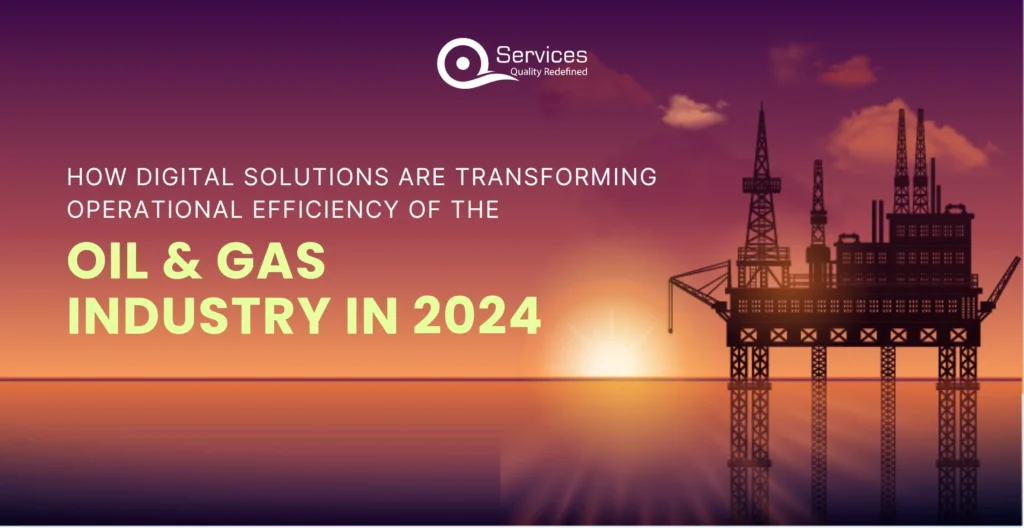Home » How Digital Solutions Are Transforming Operational Efficiency of the Oil & Gas Industry in 2024

Massive volumes of data are produced by the oil and gas sectors across various operations such as exploration, drilling, production, and refining. With data coming in various formats, including sensor readings, geological models, seismic data, and more, traditional methods of data management and analysis are often insufficient. With the help of digital technologies such as advanced analytics, machine learning, and Microsoft Power BI, companies can optimize their production systems, reduce downtime, and increase output without significantly increasing operational expenses. According to reports, the digital oilfield market, including analytics, cloud computing, and IoT, is expected to surpass US $20 billion.

“In an era of digital disruption, the oil and gas industry faces mounting pressure to modernize operations and adopt innovative technologies. Digital transformation is no longer a choice but a strategic imperative for companies seeking to thrive in a rapidly evolving landscape.” – The Economist
Digital transformation in the oil and gas industry involves using modern technologies to make operations better. This includes everything from finding oil to refining it and delivering it to customers. These technologies encompass advanced analytics, artificial intelligence, machine learning, Internet of Things (IoT) , cloud computing, and automation. Though adoption of digitalization is possibly less common in the oil and gas business than in other industries, there has been a noticeable modernization shift because of the recent decline in oil prices. Businesses are spending more and more on technology like predictive maintenance systems to cut downtime and data analytics to optimize drilling operations. The industry’s embrace of digital transformation projects has accelerated due to the demand to increase efficiency and save costs.
Digital solutions enable oil and gas companies to swiftly adapt to fluctuating market conditions, ensuring competitiveness despite volatile oil prices by providing real-time data analysis and decision-making tools to optimize strategies in response to changing market dynamics.
Digital technologies streamline operations, optimize asset reliability and minimize downtime. AI, machine learning, and oil and gas IoT solutions drive efficiency improvements, resulting in significant cost savings for companies.
Oil and Gas IT Solutions provides advanced digital tools such as AI and machine learning enhance production processes, boosting output while aligning with environmental sustainability goals by reducing carbon emissions.
The oil and gas industry is redefining efficiency management in maintenance operations using digital twins and AI-based simulations. Digital twins facilitate the creation of virtual environments for maintenance procedure simulation by generating digital copies of physical assets, such as drilling equipment or offshore platforms. This reduces downtime and related expenses by enabling maintenance teams to anticipate problems and proactively improve maintenance plans. Additionally, immense amounts of operational data are analyzed using AI-based simulations to forecast equipment breakdowns and provide preventive maintenance procedures.
Tailored IT solutions, including IoT for oil and gas, designed specifically for the oil and gas sector are instrumental in driving digital transformation within the industry. These specialized services span a broad spectrum, comprising cybersecurity solutions to safeguard critical assets, advanced data management platforms for efficient handling of vast datasets, custom software development to address unique operational needs, and robust cloud computing infrastructure for scalable and flexible computing resources. By leveraging these comprehensive IT services, oil and gas companies can effectively harness the power of digital technologies to streamline operations, bolster cybersecurity defenses, ensure regulatory compliance, and foster innovation across all facets of their business operations.
We invite you to read our in-depth research in the blog The Role of Azure Analytics in Oil and Gas Efficiency for more information on how Azure Analytics helps to improve efficiency in the oil and gas industry. This insightful document explores how crucial Azure Analytics is to streamline operational procedures and enabling long-term expansion in the oil and gas industry.
Get free Consultation and let us know your project idea to turn into an amazing digital product.
To maintain the operational efficiency of the oil and gas industry, it’s imperative to implement a range of strategic actions across various fronts.
In today’s oil and gas industry, where risks abound, ensuring safety and regulatory compliance is crucial. Powerful gadgets known as IoT Sensors and wearables serve as vigilant guardians, continuously monitoring both equipment and workers in real-time. They are poised to detect any signs of trouble, such as unusual temperatures or gas leaks. However, their function extends beyond data collection; they are integrated with predictive analytics. These analytics algorithms meticulously sift through the data from the sensors, identifying patterns that could indicate potential safety risks or violations before they escalate into serious issues. This proactive approach enables us to peer into the future of safety, empowering us to take preemptive measures to ensure the well-being of everyone involved and comply with regulations.
Maximizing production efficiency in the oil and gas sector is vital for optimal output and cost-effectiveness. Strategies such as production optimization, which involves activities like near-wellbore management and hydraulic fracturing, are crucial. Advanced completion techniques like intelligent well completions and multi-lateral wells enhance productivity while minimizing costs. Digital twins offer virtual replicas of physical assets, enabling scenario simulation and predictive maintenance. Automation and robotics streamline operations, reducing manual intervention and enhancing safety in hazardous environments. These technologies play a pivotal role in achieving efficiency and minimizing risks in oil and gas production.
Cost optimization is crucial for operational efficiency in oil and gas and digital solutions play a key role. Advanced analytics, machine learning, and AI enable data-driven decisions, while supply chain management software optimizes procurement and inventory, reducing excess and storage costs. IoT sensors and smart meters monitor energy consumption, AI suggests energy-saving measures, and robotic process automation streamlines tasks, cutting labor costs. Digital twins simulate scenarios and extend asset lifespan, cloud computing reduces hardware and maintenance costs, and IoT enables remote monitoring, reducing travel expenses and enhancing safety. Virtual collaboration tools streamline communication and project management, while AI-driven predictive maintenance minimizes downtime and simulation software optimizes workflows, reducing waste.
Oil and gas companies face mounting pressure from various stakeholders to slash emissions, prompting a concerted effort towards decarbonization. While technological advancements such as innovative fuels and carbon capture solutions are pivotal, operational excellence also holds significant sway in this endeavor. Efficiently managed machinery and operations inherently translate to reduced carbon intensity. Through operational excellence, oil and gas operators can curtail energy consumption, minimize natural resource utilization, and streamline processes to mitigate carbon emissions across the value chain. This approach not only aids in immediate decarbonization efforts but also yields cost savings and enhances overall efficiency, positioning companies as responsible stewards of the environment while bolstering their bottom line.
In the oil and gas sector, downtime poses a significant threat to productivity, underscoring the paramount importance of asset reliability. Condition-Based Monitoring emerges as a significant strategy, enabling proactive maintenance through continuous surveillance of asset health and the anticipation of potential failures. Considering an offshore drilling rig equipped with sensors that monitor equipment vibrations and temperature fluctuations in real-time. These sensors feed data to sophisticated analytics systems that can detect anomalies indicative of impending mechanical issues, allowing maintenance teams to intervene before a breakdown occurs. Furthermore, Digital Work Orders and Maintenance Management systems streamline maintenance workflows by digitizing and automating tasks. By facilitating timely interventions and minimizing costly downtime, these digital solutions not only enhance asset reliability but also optimize operational efficiency in the oil and gas industry.
Beyond the core operational areas, additional technological advancements are driving further efficiencies. Enterprise Cloud Computing provides the scalability and flexibility needed for seamless data management and analysis. Virtual and Augmented Reality (VR/AR) revolutionizes training by offering immersive experiences that simulate real-world scenarios and enhance safety protocols. Finally, Blockchain-Based Data Exchange ensures transparent and secure data sharing across the supply chain, automating processes and fostering trust between stakeholders.
As we witness the oil and gas industry undergoing a profound digital transformation, it becomes increasingly clear that adopting digital solutions is not just advantageous but essential for companies to thrive in today’s competitive environment. With vast amounts of data being generated across diverse operations, traditional methods of management and analysis are proving inadequate. However, by integrating advanced technologies such as artificial intelligence, machine learning, and IoT, companies can optimize production systems, minimize downtime, and boost output while keeping operational costs in check.
Moreover, the imperative for digital transformation in the oil and gas sector goes beyond mere operational efficiency. It encompasses crucial aspects such as safety, compliance, cost reduction, and environmental sustainability. Through the adoption of these digital solutions in 2024, companies can fortify safety measures, streamline production processes, enhance asset reliability, and mitigate carbon emissions throughout their operations.
In navigating this era of digital disruption, it’s imperative for oil and gas enterprises to prioritize digital transformation initiatives and embrace innovation across all facets of their operations. By doing so, they safeguard their competitiveness in a rapidly evolving market and lay the foundation for a more sustainable and efficient future for the industry.

Content Moderator

Founder and CEO

Chief Sales Officer
